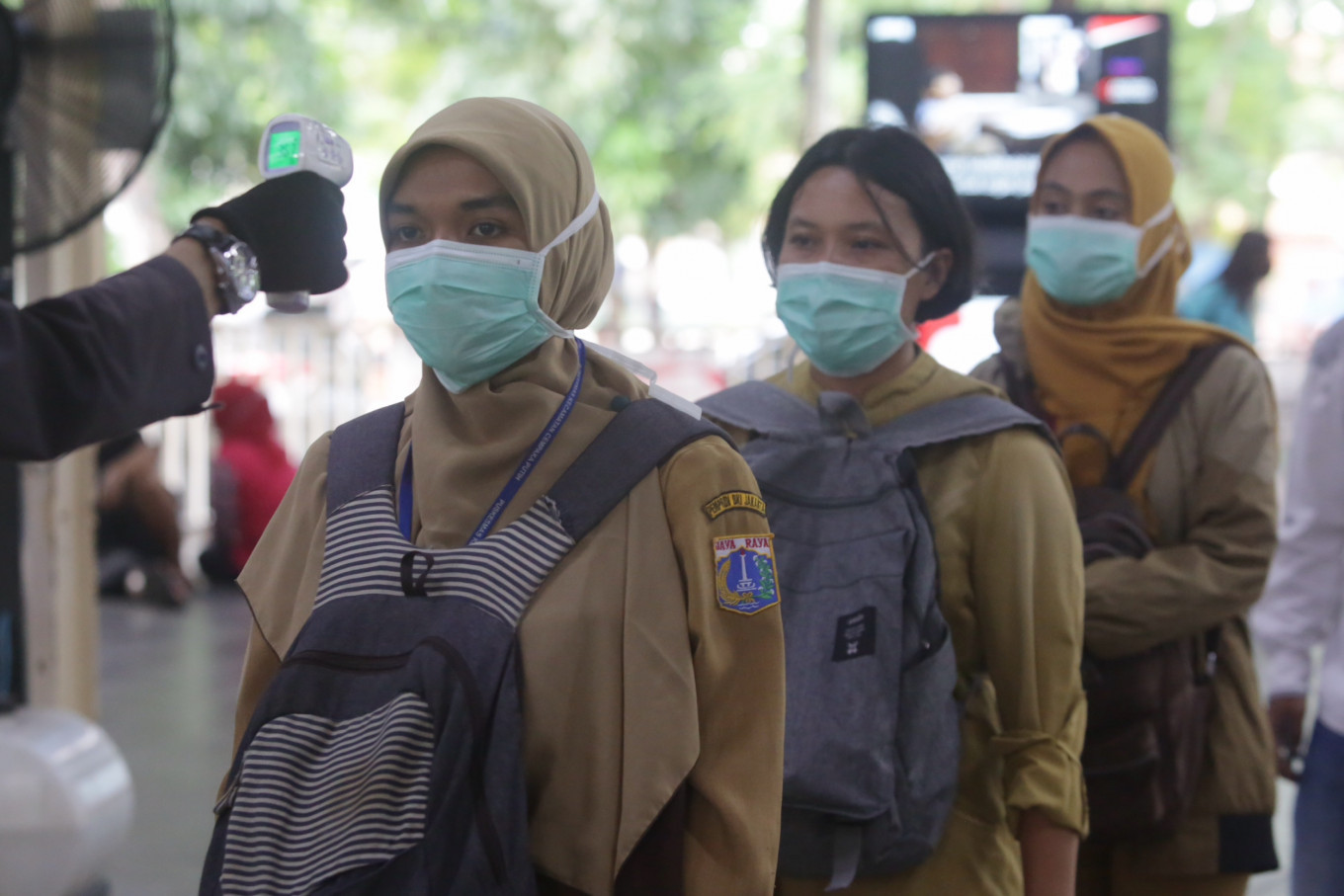Greater Jakarta in dark about ‘new normal’ commute

Commuter line passengers wait for the train at Manggarai Station, Jakarta, on Tuesday. (JP/Wendra Ajistyatama)
JAKARTA — Congested roads and jam-packed train cars during rush hour are considered ordinary in Jakarta, a daily destination for several million workers commuting from its satellite cities.
However, after the COVID-19 epidemic struck the nation’s capital, many workers were either laid off or asked to work from home, uncertain when they would return to normal office hours and commutes – if ever.
It wasn’t until the government started hinting at a post-COVID-19 “new normal” that the debate about commuting in the urban area of about 30 million began in earnest.
About 11 percent of Greater Jakarta’s inhabitants over five years old are commuters, with seven out of 10 belonging to the productive-age population, according to the 2019 Greater Jakarta Commuter Survey by Statistics Indonesia (BPS).
From these figures, about 80 percent of the city’s 3.2 million commuters are office workers.
Article continues after this advertisementDespite the fact that some 72 percent of commuters use private vehicles such as cars and motorcycles, many still rely on public transportation, such as the commuter railway line, Transjakarta buses, Jak Lingko public minivans, the MRT and the LRT.
Article continues after this advertisementIndonesian Transportation Society (MTI) secretary general Harya S. Dillon said that demand for mass transportation services during the “new normal” would rely largely on how businesses adapted to the post-COVID-19 world.
Adjustments in business processes, including work-from-home policies, were to be expected and would likely reduce congestion on roads and on public transportation during rush hour, Harya said.
“The current unknown factor is whether employers are learning lessons from the past three months or are simply considering them a temporary disruption, as if there’s nothing to learn,” Harya told The Jakarta Post on Tuesday.
“[If it is the latter], then we’d be returning to the old normal.”
Java accounted for nearly 60 percent of the nation’s total GDP last year, mostly thanks to the economic powerhouse of Greater Jakarta. Serious changes in the commuting behavior of Greater Jakarta residents may put a dent in the nation’s GDP.
Shinta Widjaja Kamdani, deputy chairwoman of the Indonesian Employers Association (Apindo), said that many companies were in the midst of reviewing their business processes, with practices likely to differ for each industry.
Some might extend the work-from-home policy, while others are likely to reintroduce working at the office.
“Workers in factories, hotels and the transportation sector, for instance, cannot work remotely. But there will surely be some adapting to be done for certain types of work,” she told the Post.
Health Minister Terawan Agus Putranto recently signed off on a set of guidelines for workplaces to usher in the new normal.
Those guidelines include a clause stipulating that employers are to provide, where necessary, shuttle services for their workers as a possible replacement for public transport.
This is unlikely to occur in practice, however, as most companies would struggle to pay for the additional services, Shinta said.
The economic prospects of maintaining passenger loyalty to public transport are also slim, particularly as restriction policies have resulted in a slump in revenue.
The commuter line operator has recorded an 80 percent decrease in daily passenger traffic, while the decrease for MRT Jakarta stands at 90 percent after two months of COVID-19 restrictions.
Meanwhile, other expenses borne by the operators, especially for provisions such as hand sanitizer, thermometers and masks, have risen.
The situation could worsen if subsidies for public transportation are cut, Harya said.
The Jakarta administration has proposed cutting subsidies for Transjakarta and Jakarta’s MRT and LRT services in a budget reallocation to accommodate the cost of the nation’s response to COVID-19. The administration and the Jakarta Council will start discussing the proposal in July during the deliberation of the 2020 revised city budget.
“It is a matter of priority. Authorities must treat public transport as an essential service, just like the health and education sectors. If [operators] face financial constraints, the government shouldn’t be hands-off and [should instead] take responsibility,” Harya said.
Transportation Study Institute (INSTRAN) executive director Deddy Herlambang suggested that operators should be more creative in seeking revenue outside of ticketing, such as through advertisements, retail tenants and land assets. Another option was to have the state reimburse expenses related to health protocols, especially as the pandemic had been designated a national emergency.
For more news about the novel coronavirus click here.
What you need to know about Coronavirus.
For more information on COVID-19, call the DOH Hotline: (02) 86517800 local 1149/1150.
The Inquirer Foundation supports our healthcare frontliners and is still accepting cash donations to be deposited at Banco de Oro (BDO) current account #007960018860 or donate through PayMaya using this link.